(Originally published on euroviews)
A week at arrivals.
Berlin Hauptbahnhof during war
Observations from March 2022
Sunday
It’s Alanas first day volunteering. She has a pink face mask and face tattoos, a roman numeral over one of her eyebrows. “I took in a refugee yesterday,” she says, “So I came here to see how it is.”
The Berlin central station is covered with signs in Ukrainian. Everyday thousands of people arrive from the borders. Outside the main entrance there’s a big white welcome tent, a few police cars stand around it. A fire truck, and a car from the German Red Cross. A company is handing out free SIM cards to Ukrainian refugees. And everywhere in the crowds are volunteers in yellow and orange vests. They’re easier to spot than the refugees themselves, not a constant flow this Sunday morning, but only a few of the crowding couples and families.
Alana gives a quick tour of the place, walks into a part of the station that’s been closed off for other travelers. “This area is where you get basic hygiene stuff,” she says. It looks almost like an airport, with tall grey walls and bright lights from high up in the ceiling. People sit on foldable chairs and tables, stretching out to the left and right.
“It’s quite well organized,” Alana says, “We get an introduction, we’re taught where the trains go from.” She walks back out to the main platform, where most people go for tickets, “there’s the info center for help.” She’s gotten the wrong vest, orange instead of yellow, signaling that she speaks Ukrainian or Russian, so people keep coming up to her to ask her questions in a language she doesn’t understand. She points them forward, towards others.
“You just do as much as you can, in the way you can,” Alana says, “It’s quite overwhelming. Where do you start?”
Monday
A group of about 50 people stand in the corner of a platform. A white sign says volunteer briefing every 25 mins. A woman stands on a box to be a bit taller than the people in front of her, explaining that “There’s no tickets for the buses, you don’t need tickets..” When she’s finished, people walk up to register and grab their vests.
“I don’t really speak Russian, but I learned in school,” a girl says as she she walks away, puts on her yellow vest. As everyone has left, new volunteers are already lining up along the lines taped on the floor. Next to them someone has written a list of advice and encouragement on a tall whiteboard, It’s a marathon, not a sprint, it says at the bottom.
“Berlin is pretty much full now, so we encourage people to go to different cities,” says one of the people handing out vests. “There’s definitely more arriving than last week, that’s for sure,” another adds. But a man and woman standing further away say that “every day it’s..,” they struggling to find the english word for it, “slowing down”, the woman says, “Not much, but a little bit less.” People are saying opposites, and refugees arrive in waves, a lot on when a train arrives, and then no one until the next.
Outside it starts to rain. The smell of it hits before the drizzle. It’s gotten dark and a man is standing right outside the doors, playing his violin right under the overhang of the tall ceiling of the station.
Tuesday
By Tuesday morning the station has almost emptied out. A few volunteers are getting their briefings downstairs, but they’re just standing in a little group, talking, no organized speech. A mother sits with her kids on a bench, a few more are running around in the play rooms. The play rooms are really waiting rooms, but now the inside of the glass dividers are decorated with kids paintings, and on the chairs stand boxes with donated toys. Three young guys walk by holding paper cups of coffee.
It’s cloudy outside. Humid in the air, the sun breaking through every now and then.
Wednesday
Kate arrives on a Wednesday. She sits outside with her friend, on unsteady chairs outside a closed cafe, trying to put her new SIM card into her phone.
She has left her home city of Kiev. Why? “Well, a war,” she answers, and then an almost laugh. But she continues: “Everyday you hear the sirens, and the sound of bombs. It’s very hard for the mental..” she gestures to her head.
She started traveling a few days ago and met her friend with the pink hair, who sits across from her, along the way. They arrived to Poland, before continuing here. Her brother is still in Kiev, and her sister as well, volunteering in the city. She and her friend want to stay in Berlin, but they don’t know exactly where. “She knows someone,” she says, gesturing to her friend. On their table there’s a paper with instructions, different ways of getting help.
“There’s this feeling for you, you know that life will not be the same, because of this,” she says, turning her phone in her hands, “People in nature want stability, war brings the opposite thing.” She speaks with clarity but heaviness, slow and with pauses sometimes, excusing herself when she can’t find the right word or expression.
“I want to speak about it, but it’s hard,” she says. It’s cold outside even if the sun is out, and she sits with her jacket on, scarf wrapped high.
“We are not planning to stay here forever,” Kate says. “We still believe everything will be over. We want to go back, to our home.” She takes a pause, “It’s hard.”
Thursday
It’s night time. Past 10. Dark. Three volunteers are smoking outside the station. A drunk man staggers around, everyone hesitant about whether they should approach him. People are still arriving.
A family walks in through the station doors, flanked by people with vests. The kids at the end are carrying balloons, one of them is smiling. Someone’s on crutches, a woman carries toys and papers under her arm. Volunteers help carry the bags. They’ve left the welcome tent, and are heading into the station now, to go somewhere new.
Friday
It’s after seven and the sun is down, sky blue. At Brandenburger Tor there’s been a small protest for “friends of Russia”.
“Of course I don’t like war, but..” one woman says and shrugs. She talks about sanctions and the sending of weapons, and sees NATO as the real instigators of the invasion.
She says people haven’t showed up for todays demonstration like they did for Ukraine, which is true. A few weeks ago, a hundred thousand people gathered at the same place, protesting against Russia. (And in a few days there will be a big stage built right where she’s standing, with famous artists performing to raise money for Ukraine.)
At the station, later in the evening. A woman sits on a bench, wrinkled face and long skirts. Behind her is a small billboard, an ad for a museum in the city. She has one leg over the other, wears a pink hat with a brooch in it. She’s sitting still as the people around her speak, gesticulate, and stand around. Even as people walk past, she keeps lookin straight ahead, hands crossed in her lap.
Saturday
The amount of people arriving everyday is in the thousands.
“Five to seven thousand per day,” says Barbara Breuer, press contact for the Berliner Stadtmission. They organize the white welcome tent right outside the station, the first stop for people who arrive without knowing where to go next.
They got asked if they could organize the tent since they already had some contacts, “Colleagues of mine were already working there,” Barbara Breuer says. But inside the station a lot of people have organized themselves, with support from DB.
A lot of people have showed up to help, and she thinks it’s normal, “It’s very human that engagement is high in the beginning,” she says, but she’s also seen a lot of people burn out after two or three weeks. “It’s important that volunteers are managed,” she says, and the best advice she has is to always decide how long you’re going to stay, and then stick to it. A lot of people find it difficult to leave. “If you say 6-8 hours, then go home,” she says, “Like this is the line. There’s always more people who need help.”
Extra trains have been put in to help with the stream of people, “In the beginning there were six trains per day from east, from Poland, now there’s fourteen,” she says. But few stay in Berlin these days. People get their tickets at the station, and go, usually to people they know. About 1500 per day pass through the welcome tent, for the people who don’t know where they’re going next.
“Everyday four or five kids arrive by themselves,” she says. A lot of them are teenagers, people closer to eighteen, but there’s also young children, who might have lost their families somewhere along the journey. “And in that case we help find them.”
Barbara Breuer is impressed by the friendliness and calmness of the Ukrainian people, “People say come to visit us in Kiev in the summer,” she says, ” I hope they can go back. Live happily ever after.” But she also talks about the most recent bombings, hesitant about what Ukraine will look like when summer comes.
Sunday
Outside it’s warm and crowded in the late afternoon sun. Next week is to be sunny in Berlin, true spring, at least according to the weather report. On the way to the welcome tent people are giving out little gifts for the children – a coloring book, a toy, crayons in a plastic package.
Inside, on the lower floors, it’s always the same temperature. A man walks slowly across one of the platforms, sweeping up dust and old receipts. Then the volunteers line up, a few minutes before the train rolls in.
It’s a arriving from east, with an indiscernible mix of refugees and tourists, or business visitors. It’s not very busy, and not every volunteer needs to help. Some of them just stand or walk around for a little bit, as people leave up stairs and escalators with their bags.
The lights in the train turn off, and in the empty dining car two of the personnel sit by the guest tables, uniforms white in the dark. Within a few minutes the platform is calm. Within ten, it’s quiet again.
KVINDESMEDIEN – A BRAND BUILT ON THE INVERTED STEREOTYPE
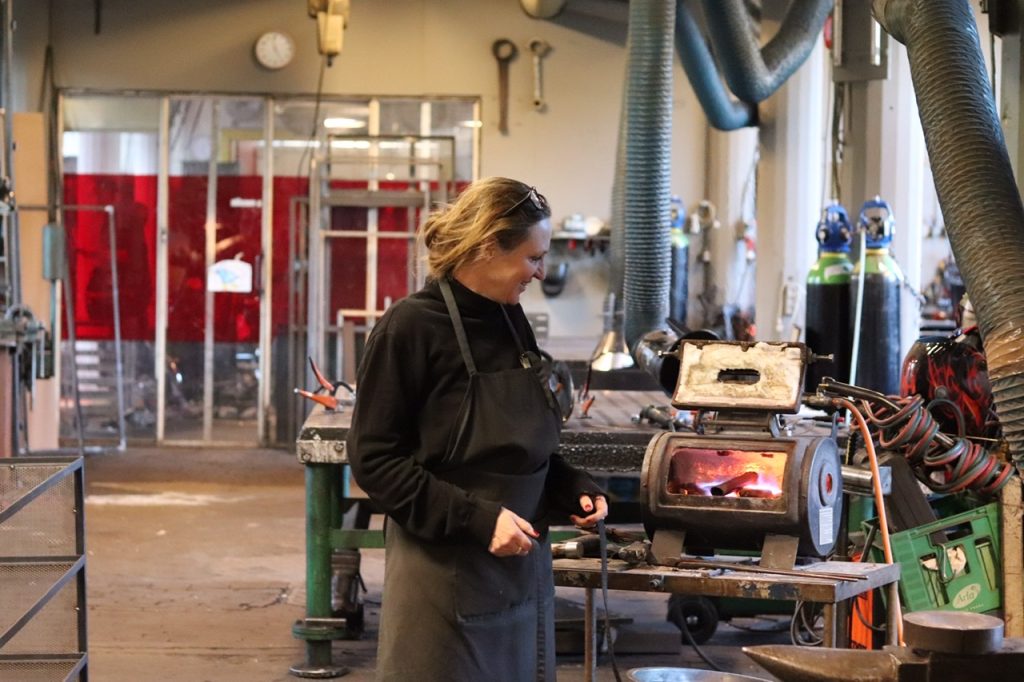
Charlotte Steen runs the womens blacksmith shop in Christiania, located in a red brick building in the heart of the community. There she welcomes women into a profession that has traditionally been closed for them.
On tables in her studio stand tall, square vases in metal, with sculptures of red poppies inside, next to a glass vase with live ones. The womens blacksmith used to take up only a corner of the big building.
“There was a little workshop over there, with two women,” Charlotte Steen says and point over to a corner. The two women were making things for the bikes and for the stores in Christiania.
“They were making all kinds of things for building a town, because it was what Christiania was. It was a group of people who wants to build a town,” Charlotte Steen says, “But a special town.”
Charlotte Steen has good memories of Christiania ever since she first came here, as a ten year old, going with a friend to visit, “I remember when growing up, people were talking to me like we were on the same level. It was that feeling,” she says, “It was quite fantastic.”
She then moved to Christiania herself, in the eighties, when a lot of the community took shape. It established itself as different from the rest of Denmark, not following the rules and legislation laid down by the state. Charlotte Steen learned to be a blacksmith from the two women who worked here before, and simply by doing, and ended up taking over and expanding the shop with her two companions.
“And then we started to teach other women,” she says. When she herself wanted to become a blacksmith, the places where you would learn didn’t take girls.
“They said you know, if there comes a girl, all the boys, they will be so crazy, they can’t work,” she says. She remembers walking into other blacksmiths and them shouting things at her, “All the men were used to have this place, without girls. So when they saw a girl..” she laughs about it. But it has also changed now, at least partly.
“Today it’s different, a lot of blacksmiths want the girls, and they say they’re so good.”
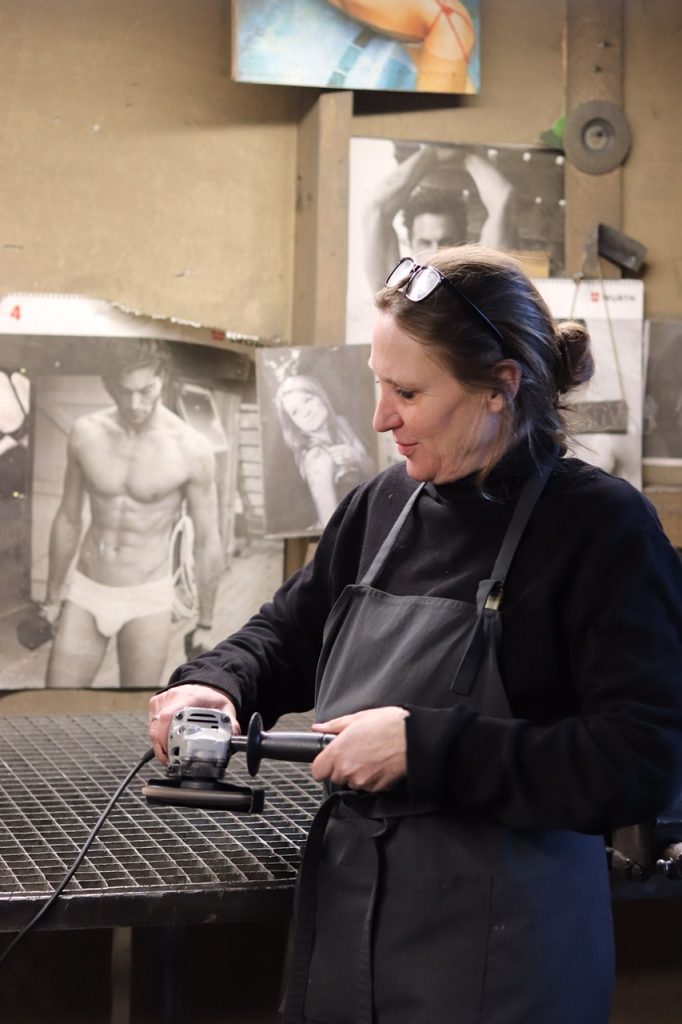
THE WILD GARDEN
Charlotte Steens describes the style of her furniture and sculptures as cozy minimalist.
“I’m not this castle like, old style. I’m maybe more modern, I would say. Simple. I’m not so romantic,” she says, “But I also have the cozy style. I like the wild garden. I’m not into the too nice flowers. I like the wild garden and the rough houses.”

Christiania is different now from when they started. Charlotte Steen thinks it’s because people were growing older, and they wanted to secure a good future for their kids and make sure they had the state support. The culture around the drugs is also different.
“The pushers came, the problems started there, many many years ago,” she says, about the way drugs are sold on the Pusher street, the main street of Christiania. “In that way, we are kind of two places,” she says, “And they know what I think, but they also know I don’t call the police about it. I live my life and they live their life. It’s a part of Copenhagen now.”
And her business is still going well, she thinks. “There’s one thing I can feel right now, that’s been changing. And it’s that people want to buy more quality,” she says, “They ask if it’s made here, is it made by real hands? They want something that is produced where they know people will be paid good. Now, quality matters more,” Charlotte Steen says, “They want something with a good story.”
FROM BOOKS TO BOARD GAMES – THE LITTLE PROTESTS
The subway stations of Copenhagen are blinking blue and yellow. Shop windows are decorated with hearts, the foreign ministry lights up, and at Kongens Nytorv hang folded hearts in blue and yellow. Everywhere, people are bringing attention to the war in Ukraine.
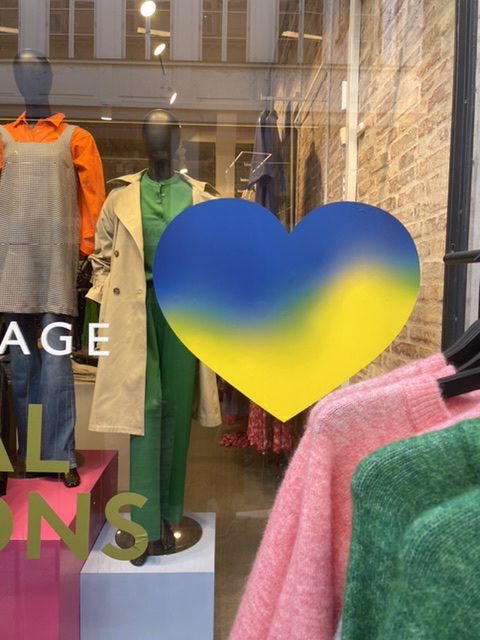
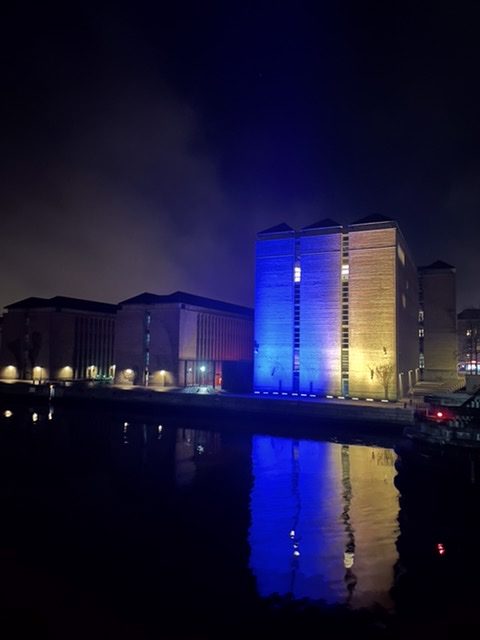
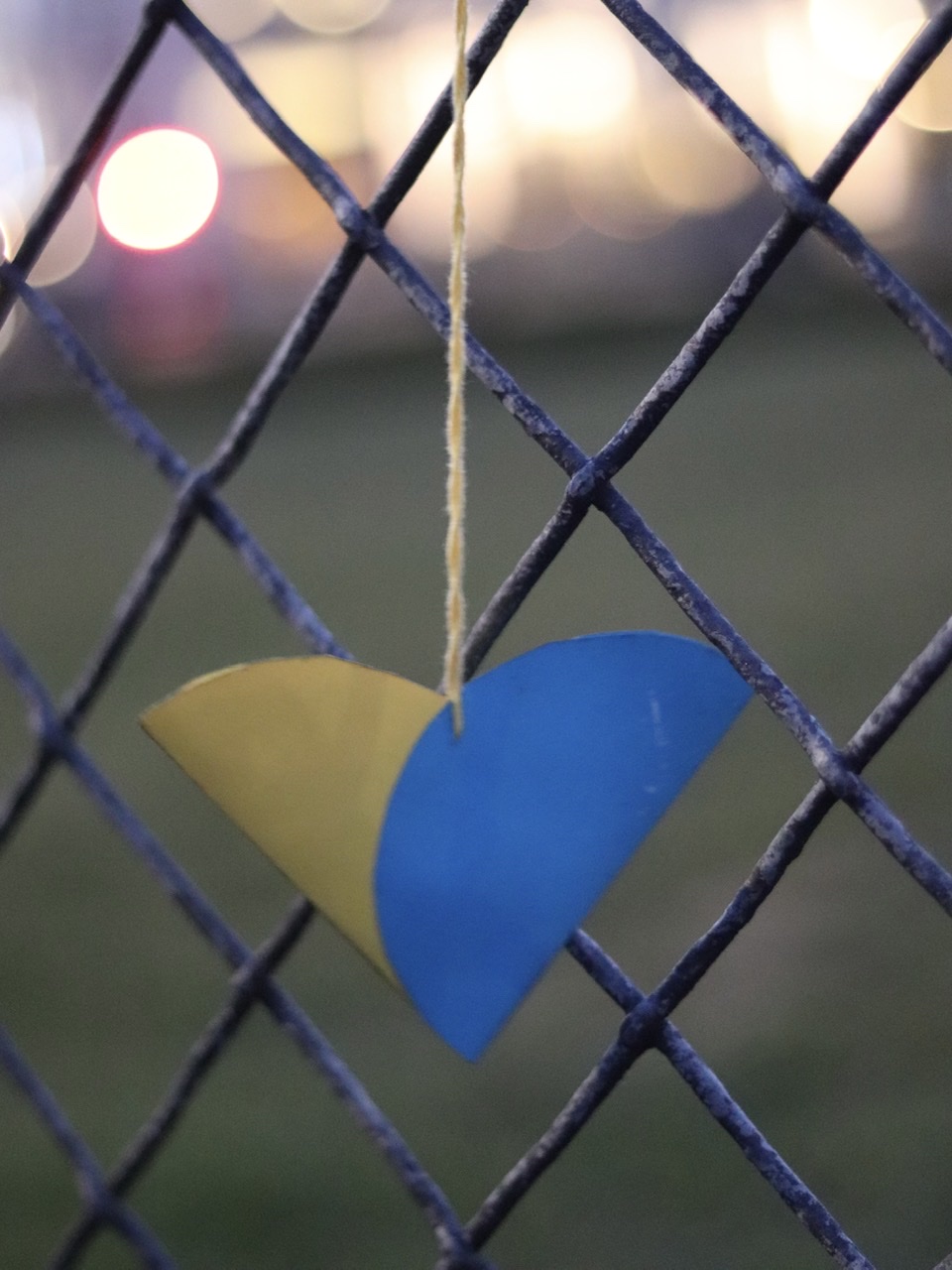
THE BOARD GAMES
A slightly unexpected way in which the actions of Russia are being protested, is through a normal board game. Simon Konski and Jeppeh Olsen own a company where they create a game based on danish culture and jokes.
“Simon got the idea that we could encourage people to donate money by offering them a game in return. So we reached out to board game cafés all over Denmark and luckily all of them was keen to help set this up,” states Jeppeh.
“It still feels like just a little drop in the ocean. But it seems like a lot of other people and companies are making large donations as well so hopefully, in the grand scheme of things, all of these together will actually help people on the ground.”

THE BOOK STORE
And even outside the city center, you will see traces of the small protests. North of Copenhagen, in a small international bookstore and cafe, the windows have been decorated with books in the colors of the Ukrainian flag.
“It was a one of our regular costumers who came in and had the idea,” says Jenny Carey, who works in the bookstore, “You get surprised how many books of the same colors you have.”
Once again it’s a small thing, but Jenny Carey thinks there’s meaning in it anyways.
“It just lets people know we’re all thinking about them,” she says, “Even in the small ways.”

The Last Day of Covid-19 in Denmark
Aarhus, Denmark.
It’s nearing midnight on the last day of corona restrictions. It’s raining in the second largest city in the country, but it’s warm and crowded in a pub next to the river. At midnight the restrictions are being lifted, and the bar will be open until five in the morning.
– It’s been a long time since we were this busy, says bartender Ruben Mortensen.
It was about a week ago that the danish health ministry confirmed that from the first of February, all Corona restrictions would be lifted. It is the low number of people in intensive care that has led to the decision, along with high vaccination rates and the majority of cases being less severe.
Sarah Klemens is sitting with her sister at the bar, and she thinks it makes sense that the restrictions are being lifted.
– Yeah, it’s the right choice, she says. There’s so many vaccinated, and I think people will still have common sense.
After this evening she’s getting rid of her mask.
– I think I’ll throw it away.

End of corona?
What’s actually changing is how Denmark is choosing to classify the virus. It’s no longer categorized as a disease dangerous to society, so it won’t be treated differently from other diseases.
In another bar in Aarhus, bartender Heidi Nielsen still has to make sure the restrictions are being followed, until they close at midnight.
– It’s been hard, especially the last few weeks. And today I it feels a bit pointless, to have to tell everyone they have to have a mask, she says.
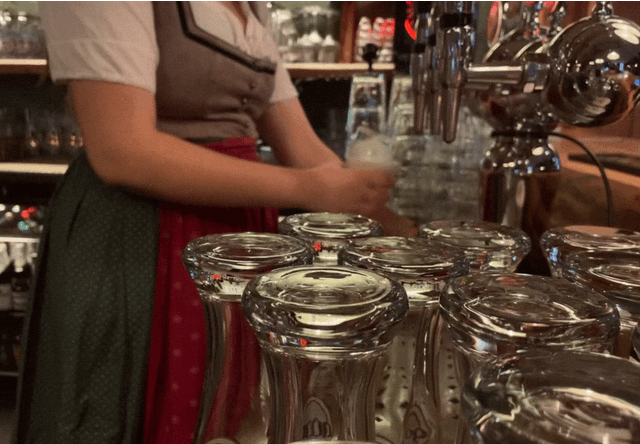
Heidi Nielsen pours a beer for guest Tobias Sievert, who thinks it’s both good and bad to end the restrictions.
–They tried before, and lifted restrictions from October til December. So maybe in the winter they might have to close up again, he says.
– In a way it makes sense, he adds, but maybe I feel like it’s too much from one day to another. Like with the mask, today it’s saving lives and tomorrow… well.
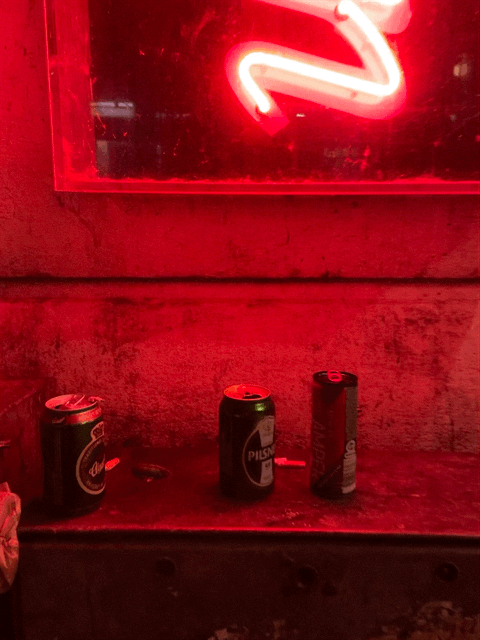
Back in the bar by the river, Sarah Klemens is thinking about new times without restrictions.
– Yeah, I look forward to it. Especially to go travel, I want to go south, or maybe to the USA.
The clock strikes midnight and the restrictions are gone, even if there’s no immediate difference in the bar. There’s a line of people waiting for drinks, and the bartenders are busy moving stools to make room for more people, making sure everyone has a place to sit.
